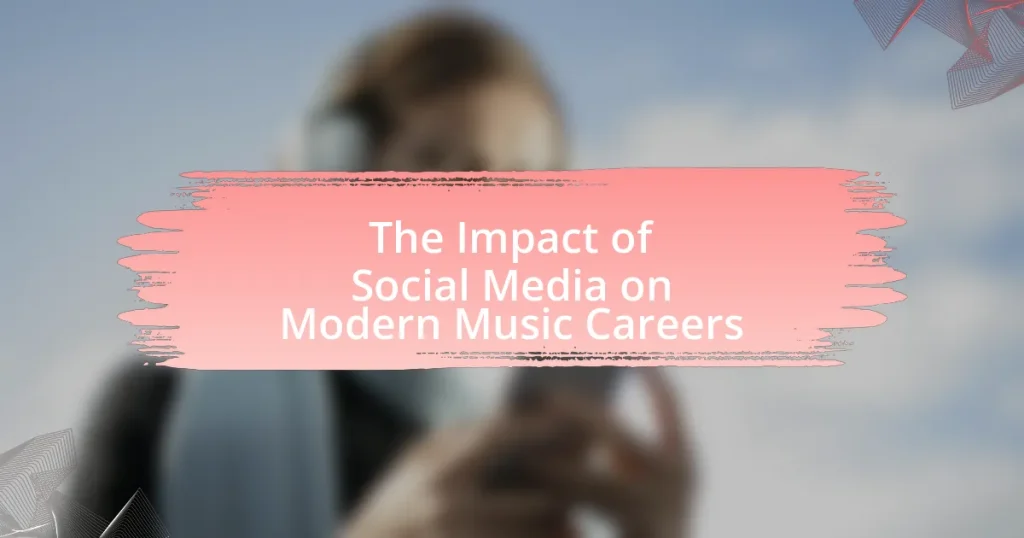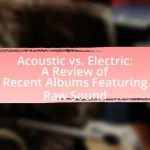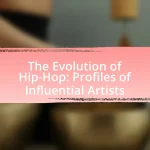The article examines the significant impact of social media on modern music careers, highlighting how platforms like Instagram, TikTok, and YouTube facilitate direct engagement between artists and fans, democratize music distribution, and enhance marketing strategies. It discusses the transformation of the music industry, emphasizing the role of social media in music discovery and promotion, as well as the challenges artists face, including oversaturation and mental health issues. Key insights include the effectiveness of social media for music promotion, the influence of algorithms on music exposure, and best practices for artists to maximize their social media presence and engagement.
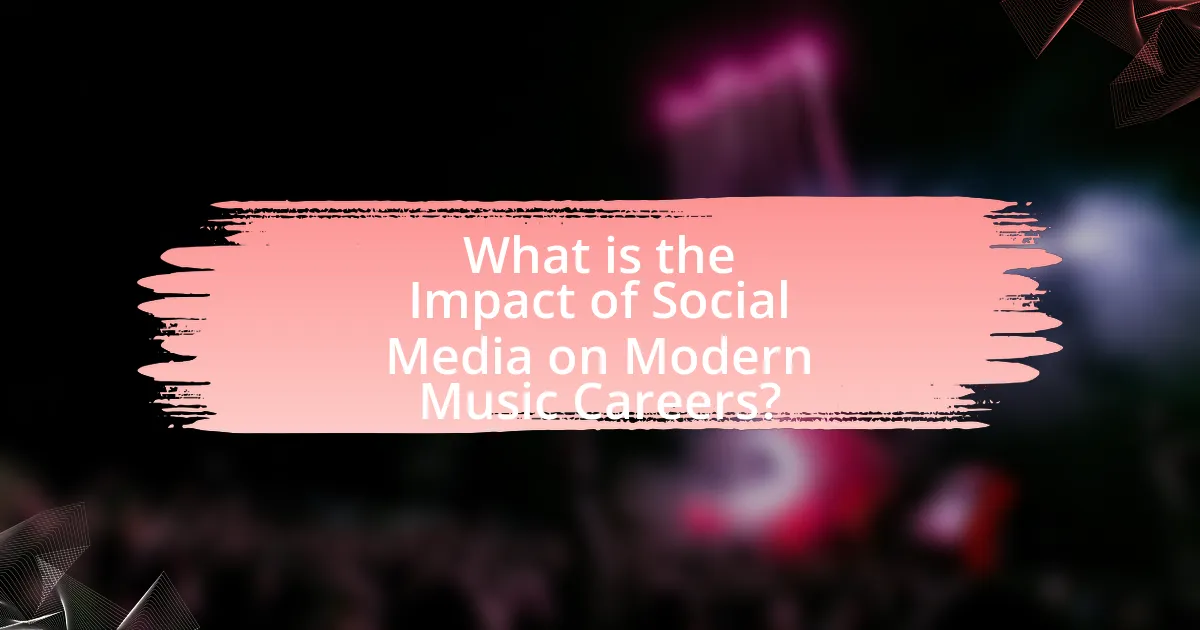
What is the Impact of Social Media on Modern Music Careers?
Social media significantly impacts modern music careers by providing artists with platforms for direct engagement with fans, marketing, and distribution. Artists can share their music, updates, and personal stories instantly, fostering a closer connection with their audience. For instance, platforms like Instagram and TikTok have enabled viral trends that can propel songs to mainstream success, as seen with Lil Nas X’s “Old Town Road,” which gained popularity through TikTok before topping charts. Additionally, social media analytics allow artists to understand their audience demographics and preferences, enhancing targeted marketing strategies. According to a 2021 report by the International Federation of the Phonographic Industry, 70% of music consumers discover new music through social media, underscoring its role in shaping music careers today.
How has social media transformed the music industry?
Social media has transformed the music industry by enabling artists to directly connect with their audience, bypassing traditional gatekeepers like record labels. This shift has democratized music distribution, allowing independent musicians to share their work globally through platforms like Instagram, TikTok, and YouTube. For instance, TikTok has become a significant driver of music discovery, with songs going viral and leading to increased streaming and sales; in 2020, 75% of TikTok users reported discovering new music on the platform. Additionally, social media facilitates real-time engagement, allowing artists to build loyal fanbases and receive immediate feedback, which enhances their marketing strategies and overall career growth.
What are the key platforms influencing music careers today?
The key platforms influencing music careers today are Spotify, YouTube, Instagram, and TikTok. Spotify serves as a primary streaming service, with over 500 million users, allowing artists to reach global audiences and generate revenue through streams. YouTube, with over 2 billion monthly active users, enables musicians to share music videos and engage with fans, significantly impacting their visibility and career growth. Instagram, a visual-centric platform, allows artists to connect with fans and promote their work through posts and stories, enhancing their personal brand. TikTok has emerged as a powerful tool for music discovery, with viral trends leading to significant increases in song streams and chart performance, as evidenced by the success of tracks like “Old Town Road” by Lil Nas X, which gained popularity through the platform.
How do these platforms change the way artists connect with fans?
Social media platforms fundamentally transform the way artists connect with fans by enabling direct, real-time communication and engagement. These platforms allow artists to share content, updates, and personal insights instantly, fostering a sense of intimacy and community. For instance, a 2021 survey by the International Federation of the Phonographic Industry (IFPI) found that 78% of music fans engage with artists on social media, highlighting the importance of these platforms in building relationships. Additionally, artists can utilize features like live streaming and interactive posts to create unique experiences, further enhancing fan loyalty and participation.
What role does social media play in music promotion?
Social media plays a crucial role in music promotion by providing artists with platforms to reach and engage with their audience directly. This direct interaction allows musicians to share their work, build a fan base, and create a personal brand without relying solely on traditional media outlets. According to a 2021 report by the International Federation of the Phonographic Industry, 75% of music consumers discover new music through social media platforms, highlighting their effectiveness in promoting artists and their music. Additionally, social media enables targeted advertising, allowing musicians to reach specific demographics, which can significantly enhance their promotional efforts.
How do artists utilize social media for marketing their music?
Artists utilize social media to market their music by engaging directly with fans, promoting new releases, and leveraging targeted advertising. Through platforms like Instagram, Twitter, and TikTok, artists can share snippets of their music, behind-the-scenes content, and personal stories, which fosters a deeper connection with their audience. For instance, TikTok has become a significant platform for music discovery, with songs going viral through user-generated content, leading to increased streams and downloads. According to a report by the Recording Industry Association of America, 70% of music consumers discover new music through social media, highlighting its effectiveness as a marketing tool.
What strategies are most effective for gaining visibility on social media?
Effective strategies for gaining visibility on social media include consistent content creation, audience engagement, and leveraging analytics. Consistent content creation, such as posting regularly and maintaining a cohesive brand voice, helps keep the audience engaged and increases the likelihood of shares, which can expand reach. Audience engagement, through responding to comments and participating in conversations, fosters community and encourages followers to promote content organically. Utilizing analytics tools allows creators to track performance metrics, enabling them to refine their strategies based on what resonates most with their audience. According to a study by Hootsuite, brands that engage with their audience see a 20-40% increase in customer loyalty, highlighting the importance of these strategies in enhancing visibility.
What are the challenges artists face with social media?
Artists face several challenges with social media, including oversaturation, algorithm changes, and mental health issues. The oversaturation of content makes it difficult for individual artists to stand out, as millions of posts compete for attention daily. Additionally, frequent changes in social media algorithms can limit an artist’s visibility, impacting their ability to reach audiences effectively. Mental health challenges arise from the pressure to maintain a constant online presence and the potential for negative feedback, which can affect an artist’s creativity and well-being. These challenges highlight the complex relationship between artists and social media in the context of modern music careers.
How does the pressure of social media affect artists’ mental health?
The pressure of social media significantly affects artists’ mental health by increasing anxiety, depression, and feelings of inadequacy. Artists often face constant scrutiny and comparison to peers, leading to heightened stress levels. A study published in the journal “Psychology of Popular Media” found that 70% of musicians reported experiencing anxiety related to social media engagement, which can exacerbate mental health issues. Additionally, the need for continuous content creation can lead to burnout, as artists feel compelled to maintain an online presence to stay relevant. This cycle of pressure can create a detrimental impact on their overall well-being.
What are the risks of negative feedback on social media platforms?
Negative feedback on social media platforms poses significant risks to individuals and brands, particularly in the context of modern music careers. Such feedback can lead to reputational damage, as public perception can shift rapidly based on negative comments or reviews. For instance, a study by the Pew Research Center found that 70% of social media users have witnessed online harassment, which can deter potential fans and collaborators. Additionally, negative feedback can impact mental health, leading to stress and anxiety for artists, as highlighted in research published in the Journal of Music Therapy, which indicates that social media interactions can exacerbate feelings of isolation and self-doubt among musicians. Furthermore, negative comments can influence algorithms, reducing visibility and engagement, which is crucial for an artist’s success in a competitive digital landscape.
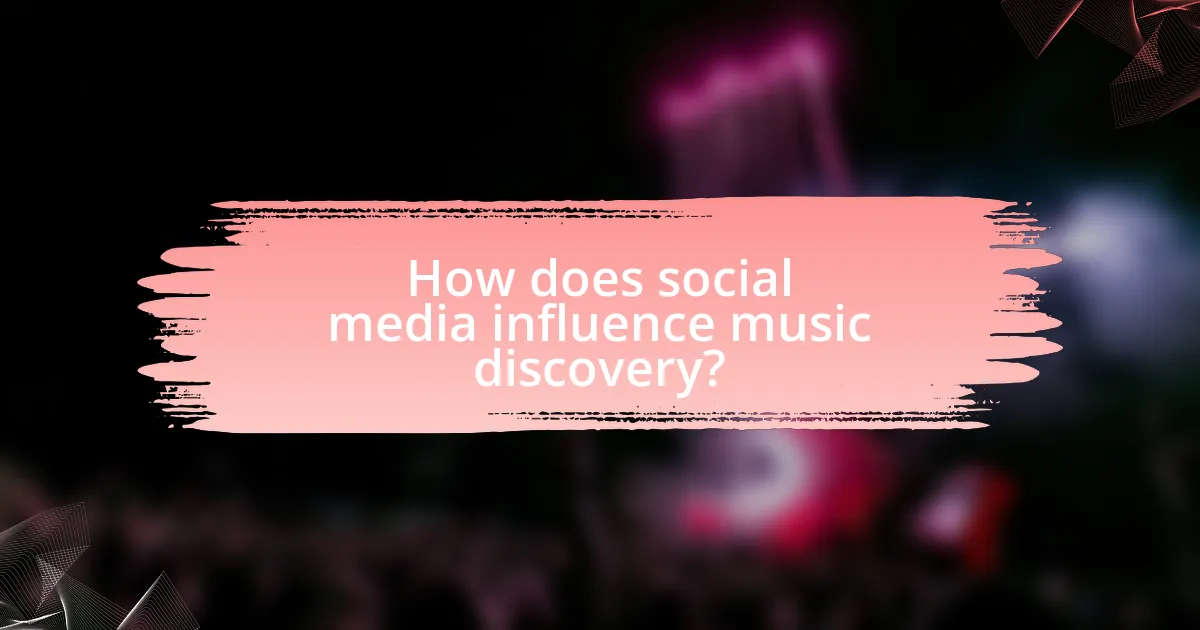
How does social media influence music discovery?
Social media significantly influences music discovery by providing platforms for artists to share their work directly with audiences, bypassing traditional gatekeepers like record labels. This direct access allows emerging musicians to reach global audiences quickly; for instance, platforms like TikTok have propelled songs to viral status, with 67% of users discovering new music through the app, according to a 2021 report by the Recording Industry Association of America. Additionally, social media algorithms curate personalized content, making it easier for users to find music that aligns with their tastes, further enhancing the discovery process.
What impact does social media have on music trends?
Social media significantly influences music trends by enabling rapid dissemination and discovery of new music. Platforms like TikTok and Instagram allow artists to share their work directly with audiences, leading to viral hits and shifts in popular genres. For instance, the song “Old Town Road” by Lil Nas X gained immense popularity through TikTok, showcasing how social media can propel a track to mainstream success. Additionally, social media analytics provide insights into listener preferences, helping artists and labels tailor their marketing strategies effectively. This direct engagement fosters a dynamic music landscape where trends can emerge and evolve quickly, reflecting real-time audience reactions.
How do viral trends shape the success of new artists?
Viral trends significantly enhance the success of new artists by rapidly increasing their visibility and audience reach. When a song or performance goes viral, it can lead to millions of views and shares across platforms like TikTok, Instagram, and YouTube, creating a snowball effect that attracts attention from record labels, media, and fans. For instance, the song “Old Town Road” by Lil Nas X gained immense popularity through viral challenges on TikTok, leading to its record-breaking run on the Billboard Hot 100. This phenomenon illustrates how viral trends can transform an unknown artist into a mainstream sensation almost overnight, demonstrating the powerful role social media plays in modern music careers.
What role do influencers play in music discovery on social media?
Influencers play a crucial role in music discovery on social media by amplifying artists’ reach and shaping audience preferences. They leverage their large followings to introduce new music, often curating playlists or sharing tracks that resonate with their personal brand. For instance, a study by the University of Southern California found that 70% of young listeners discover new music through social media platforms, with influencers being a significant driving force behind this trend. Their endorsements can lead to viral moments, significantly impacting an artist’s visibility and streaming numbers.
How do algorithms affect music exposure on social media?
Algorithms significantly influence music exposure on social media by determining which content is prioritized in users’ feeds. These algorithms analyze user behavior, engagement metrics, and preferences to curate personalized experiences, often favoring trending or popular tracks. For instance, platforms like Spotify and TikTok utilize algorithms that promote songs based on user interactions, leading to increased visibility for certain artists. Research indicates that TikTok’s algorithm has propelled numerous songs to viral status, demonstrating the direct correlation between algorithmic curation and music exposure. This mechanism not only shapes listener habits but also impacts artists’ careers by amplifying their reach and engagement through algorithm-driven recommendations.
What are the implications of algorithm-driven content for emerging artists?
Algorithm-driven content significantly influences emerging artists by shaping their visibility and audience engagement. These algorithms prioritize content based on user interactions, which means that emerging artists must create highly engaging material to gain traction. For instance, platforms like TikTok and Instagram utilize algorithms that favor videos with higher engagement rates, leading to a situation where artists who can produce viral content may achieve rapid growth. According to a study by the Pew Research Center, 69% of teens report using TikTok, indicating a vast audience that emerging artists can tap into if their content aligns with algorithmic preferences. Consequently, the implications include both opportunities for exposure and challenges in maintaining consistent engagement, as artists must continuously adapt to changing algorithmic trends to sustain their visibility.
How can artists navigate algorithm changes to maintain visibility?
Artists can navigate algorithm changes to maintain visibility by diversifying their content across multiple platforms and engaging consistently with their audience. By utilizing various social media channels, such as Instagram, TikTok, and YouTube, artists can mitigate the impact of any single platform’s algorithm changes. Research indicates that platforms often prioritize fresh and engaging content; therefore, regularly updating their profiles with new material can help artists stay relevant. Additionally, fostering direct relationships with fans through live streams, Q&A sessions, and personalized interactions can enhance audience loyalty, which is crucial when algorithms shift. This strategy is supported by data showing that artists who actively engage with their followers tend to experience higher visibility and growth, regardless of algorithm fluctuations.
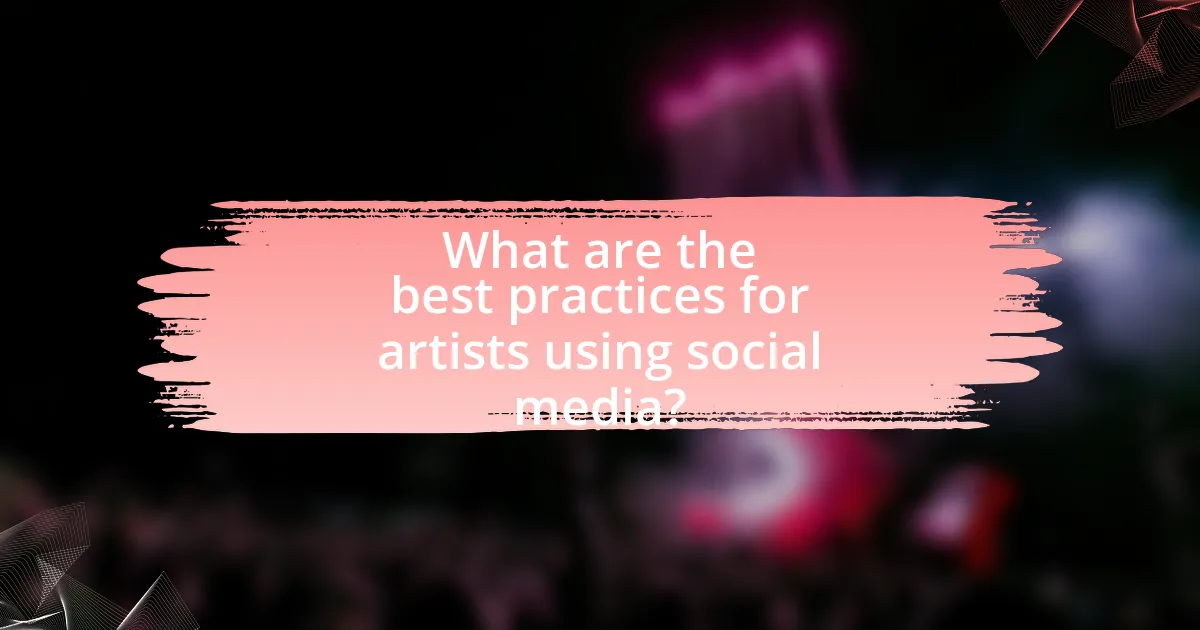
What are the best practices for artists using social media?
The best practices for artists using social media include consistent posting, engaging with followers, utilizing analytics, and maintaining a professional image. Consistent posting helps keep the audience engaged and informed about new releases or events, which can lead to increased fan loyalty. Engaging with followers through comments and direct messages fosters a sense of community and connection, essential for building a dedicated fan base. Utilizing analytics allows artists to understand what content resonates most with their audience, enabling them to tailor their posts effectively. Maintaining a professional image across platforms ensures that artists are perceived as credible and serious about their careers, which can attract more opportunities in the industry.
How can artists effectively engage with their audience on social media?
Artists can effectively engage with their audience on social media by consistently sharing authentic content that resonates with their followers. This includes posting behind-the-scenes glimpses of their creative process, interacting directly with fans through comments and messages, and utilizing live streaming to create real-time connections. Research indicates that 70% of consumers feel more connected to brands when the CEO is active on social media, highlighting the importance of personal engagement. Additionally, artists can leverage analytics tools to understand their audience’s preferences and tailor their content accordingly, ensuring higher engagement rates.
What types of content resonate most with music fans?
Music fans resonate most with content that includes behind-the-scenes footage, live performances, and personal stories from artists. This type of content fosters a deeper connection between fans and musicians, as it provides insight into the creative process and personal experiences of the artists. According to a study by the International Journal of Music Business Research, 70% of music fans reported that they feel more engaged with artists who share personal anecdotes and exclusive content on social media platforms. This engagement is crucial in building a loyal fanbase and enhancing the overall music experience.
How often should artists post to maintain audience interest?
Artists should post on social media at least 3 to 5 times per week to maintain audience interest. This frequency helps keep the audience engaged and informed about the artist’s activities, new releases, and personal insights. Research indicates that consistent posting can lead to higher engagement rates; for instance, a study by HubSpot found that brands that post 16 times per month see 3.5 times more engagement than those that post less frequently. Therefore, maintaining a regular posting schedule is crucial for artists to foster a loyal fanbase and enhance their visibility in the competitive music industry.
What tools and resources can help artists manage their social media presence?
Artists can effectively manage their social media presence using tools like Hootsuite, Buffer, and Later. Hootsuite allows users to schedule posts across multiple platforms, track engagement metrics, and manage interactions in one dashboard, which is crucial for maintaining a consistent online presence. Buffer offers similar scheduling capabilities and provides analytics to help artists understand their audience better, enabling them to tailor their content accordingly. Later specializes in visual content planning, making it ideal for artists who rely heavily on imagery to promote their work. According to a 2021 survey by the Pew Research Center, 72% of adults use social media, highlighting the importance of these tools for artists to reach and engage with a broad audience effectively.
What are the best analytics tools for tracking social media performance?
The best analytics tools for tracking social media performance include Hootsuite, Sprout Social, and Google Analytics. Hootsuite offers comprehensive social media management and analytics features, allowing users to track engagement metrics across multiple platforms. Sprout Social provides in-depth reporting and analytics tools that help users understand audience demographics and content performance. Google Analytics, while primarily a web analytics tool, can also track social media traffic and conversions, providing valuable insights into how social media efforts contribute to overall website performance. These tools are widely recognized in the industry for their effectiveness in measuring social media success.
How can scheduling tools improve an artist’s social media strategy?
Scheduling tools can significantly enhance an artist’s social media strategy by enabling consistent and timely content delivery. These tools allow artists to plan and automate posts across various platforms, ensuring that their audience receives regular updates, which can lead to increased engagement and follower growth. For instance, a study by Hootsuite found that brands that post consistently see a 67% increase in engagement compared to those that do not. Additionally, scheduling tools provide analytics that help artists understand the best times to post, optimizing their reach and impact. By utilizing these tools, artists can maintain a strong online presence, manage their time effectively, and focus on their creative work while still engaging their audience.
What tips can artists follow to maximize their social media impact?
Artists can maximize their social media impact by consistently engaging with their audience, utilizing analytics to inform content strategy, and collaborating with other creators. Engaging with followers through comments, live sessions, and direct messages fosters a sense of community and loyalty, which can lead to increased sharing and visibility. Utilizing analytics tools, such as Instagram Insights or Facebook Analytics, allows artists to understand what content resonates most with their audience, enabling them to tailor their posts for maximum engagement. Collaborating with other artists or influencers can expand reach and introduce the artist to new audiences, as partnerships often lead to cross-promotion. According to a study by the Pew Research Center, 72% of adults use social media, highlighting its significance as a platform for artists to connect and grow their fanbase.
